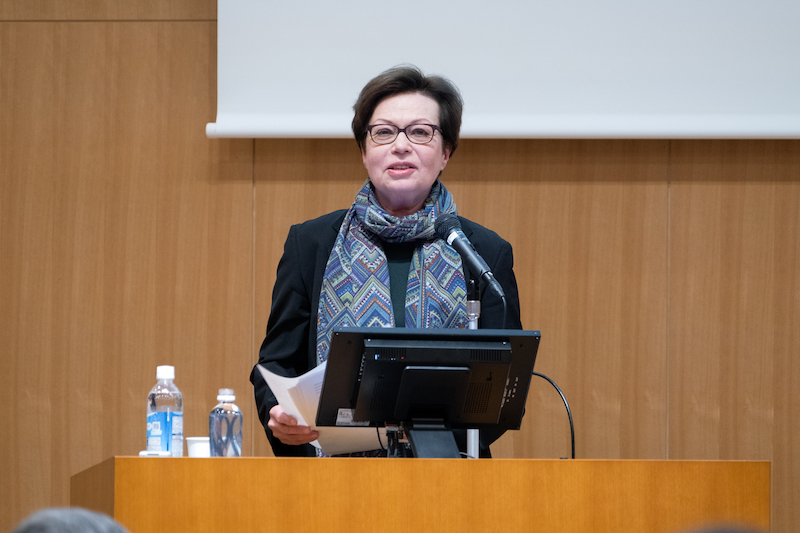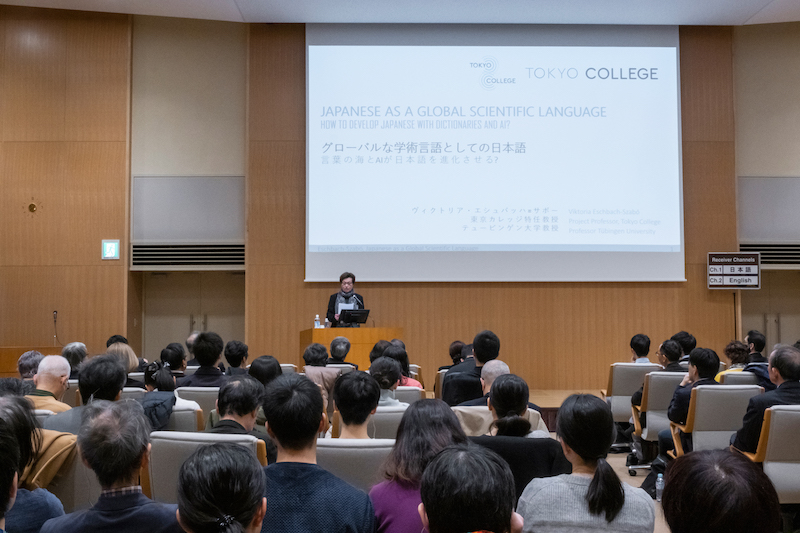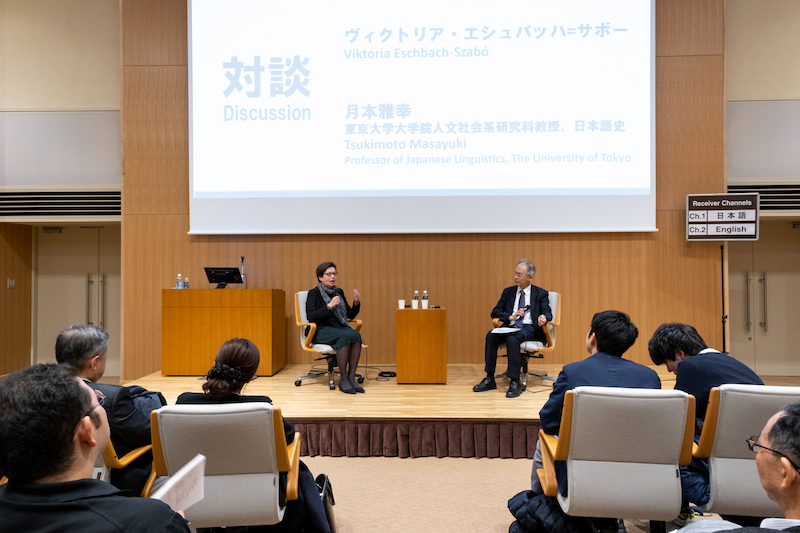Tokyo College Event “Japanese as a Global Scientific Language” by Prof. Viktoria Eschbach-Szabó
Tokyo College held a public lecture on “Japanese as a Global Scientific Language”
On February 5, 2020, Tokyo College held a lecture on “Japanese as a Global Scientific Language.” Professor Tsuyoshi Kojima (University of Tokyo) moderated, and following Professor Viktoria Eschbach-Szabó’s (Tübingen University) lecture there was a discussion between Professor Eschbach-Szabó and Professor Masayuki Tsukimoto (University of Tokyo).

Professor Eschbach-Szabó stressed the benefits of developing Japanese as a global scientific language, and the importance of strengthening linguistic and cultural connections with other languages. She talked about what could be done to acknowledge the influence of Japanese culture and develop the Japanese language more actively.
Professor Eschbach-Szabó first set out the concept of language spaces and about restructuring or changing the framework of processes on the global language map. She explained the concept of language spaces in terms of the cultivation of strata between or within languages, with derivatives such as sociolects, working-class dialects, youth dialects, Kansai dialect and Kantō dialect, and written or spoken language; contact with other languages can create new spaces in a language, as with loanwords that are borrowed from other languages and used in one’s own. Thus, even if our language spaces are defined as existing in parallel to one another, this does not deny the unity of standard language or national language. Professor Eschbach-Szabó explained that standard languages were invented in various parts of the world in the 18th to 20th centuries, and used as effective standard languages for culture and political administrations. She stated that the concept of language spaces reflects a cognizance of the extraordinary complexity of language—languages are by no means perfect or regular, but rather refer to dynamic processes for all members of society.

Professor Eschbach-Szabó explained that the dominant position of English as a common scientific language is temporary, and that the positions of all languages will change in the long-term. She then set out how Japanese could take on the global player role of a supercentral language. It was stated that although there are many commonalities between the languages of the world, they are commonalities in terms of vocabulary and expressions, and they have their own systems for meaning and values, meaning that there is a need for techniques and processes that connect language spaces. Specific examples were given, based on the historical circumstances of the West and Japan, as to how European and Japanese language spaces have come to be connected; Professor Eschbach-Szabó commented on the creation of a new language space through kanbun using kanji (Chinese characters) to connect Japan to the West in various Japanese language spaces that had existed in the Meiji era. She said that the standard language that was invented from the Meiji era has also played the role of a global language. Professor Eschbach-Szabó argued that these inventions were imported back into Europe, where the Japanese cultural package, from economics to popular culture, has spread from the 21st century: Japanese concepts and words are constantly being woven into everyday life due to the influence of ikebana, sushi, karate, and the like.
Professor Eschbach-Szabó described the relationship between language and state and the necessity of language development for state development, stressing the need to respond to the changing needs of global society by developing communication between the West and Japan, providing access to modern scientific technology, and switching from a policy oriented solely towards English. In terms of the direction of development in the 21st century, she stated the importance of how language use is connected to language development in the fields of innovative knowledge and arts, and of how, in the fields of the natural sciences and science and technology, human knowledge is connected in the AI black box.

In the discussion between Professors Eschbach-Szabó and Tsukimoto, various points of view were exchanged on issues such as the languages used at international academic conferences, changes to Japanese language education due to the multiculturalism of modern society, and the publication of Japanese language dictionaries in future.
| Date(s) | Wednesday, 5 February 2020, 5:00-6:30 pm (Doors open: 4:30 pm) |
|---|---|
| Venue |
Large Conference Room, Sanjo Conference Hall, The University of Tokyo (Hongo Campus) |
| Registration | Pre-registration required (120 seats - First come, first served) |
| Language | English and Japanese (Simultaneous translation available) |
| Abstract |
The lecture will discuss about the advantages of developing Japanese as a global scientific language and the importance of strengthening linguistic and cultural connections with other languages. Japan should be aware of the power of Japanese culture and develop Japanese more actively. |
| Speaker Profile |
Viktoria Eschbach-Szabó obtained an MA in German, Slavic, Chinese and Japanese Studies from Eötvös Loránd University Budapest (1981) and a Ph.D. in East Asian Studies from Ruhr University Bochum (1984). After teaching as a Professor of Modern Japanese Studies at Trier University she moved to Tübingen (1992) and is currently a Professor of Japanese Studies at Tübingen University as well as Co-Founder/Co-Director of the Tübingen Centre for Japanese Studies at Doshisha University (1993- ). For a long time she worked as the convenor for the Japanese Linguistics and Language Teaching Section at the European Association for Japanese Studies (EAJS) and served as President (2005-08). |
| Organized by | Tokyo College, The University of Tokyo |
| Contact | tcevent@graffiti97.co.jp |












